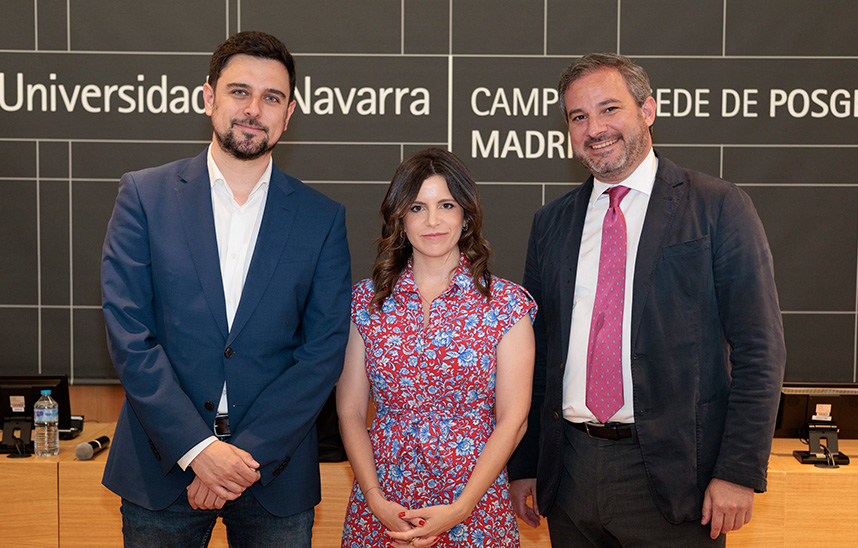Ana Iris Simón and Diego S. Garrocho reflect at the University of Navarra on the future of Christianity in an increasingly secularized society
The meeting, organized by the Master's Degree in Christianity and Contemporary Culture, in partnership with Impactum, was held at campus in Madrid.

Photo /Diego S. Garrocho, Ana Iris Simón and Ricardo Calleja.
In a context of growing secularization in Spain, where 58.4% of people declare themselves Catholics and, of these, only 19.3% claim to be practicing, according to the latest CIS data , what relevance does Christianity have? What is the role of Christians in today's public sphere? What perspectives and challenges do those who still consider religion as a fundamental pillar in their lives face? How can the message of the church be made attractive again?
Ana Iris Simón, writer, journalist and columnist for El País, and Diego S. Garrocho, Associate Dean of the School of Philosophy and Letters of the Universidad Autónoma de Madrid and Head of Opinion of the newspaper ABC, discussed these issues at the University of Navarra at a meeting organized by the Master's Degree in Christianity and Contemporary Culture of the academic center, at partnership with the Impactum Foundation. The colloquium, which was attended by more than 120 people in person and 500 online, was moderated by Ricardo Calleja, professor at IESE Business School and Master's Degree.
Calleja began the dialogue by pointing out that "our society has left Christianity with a slammed door, however, there are many who look out the window, longing for the warmth that burns in Christian communities, in the bequest of truth and beauty that they recognize in Catholicism". In this sense, the speakers agreed in pointing out beauty and its different cultural manifestations as ways to reach transcendence. According to Ana Iris Simón, "many people will approach the Church again intuitively through beauty. I have always believed that it is objective, that it is present in art and in the world, and that through these ways one can reach God". An affirmation shared by Garrocho, who said that beauty "is one of the most obvious paths to transcendence, because it is naturally inscribed in the human soul. Beautiful things are the instruments that God left in the world for us to recognize that there has been someone here building it". In his speech, he also pointed to other issues that can be ways of conversion, such as "the resounding commitment to forgiveness in the Catholic religion and its impact on the search for truth".
In the meeting also made reference letter the desire for transcendence among the new generations. Simón commented that "there is a change in the perception of the Church. For many years, in Spain, it has been associated with a dictatorship, but I believe that younger people do not see it as an ideologized instrument that participated in that period. Besides, they have a thirst for transcendence and I believe that through an almost natural way they will come to Christ". For his part, Garrocho pointed out that, in this context, there are "many signs for hope": "Generationally, young people are experiencing a new thirst for meaning, they yearn for solid values, and the best way to respond to this social demand is to offer true discourses". He also stressed the need for self-criticism on the part of Christians, as a way to reopen those doors that for many have remained closed: "What is failing the church is us Christians: when we do not recognize our mistakes, when we do not incarnate the truths of Christianity in our lives and when we do not believe well enough".
The Master's Degree in Christianity and Contemporary Culture will conclude this year's activities with an intensive week at the campus of the University of Navarra in Madrid. It will take place from June 17-19, and will feature, among other guest speakers, Gabriel Albiac, Full Professor emeritus of the Complutense University of Madrid; Msgr. Melchor Sanchez de Toca, former undersecretary of the Pontifical committee for Culture and rapporteur of the Dicastery for the Causes of Saints in Vatican City; and Inmaculada Alva, historian, researcher at the University of Navarra. The attendance is free, prior registration in this link.

